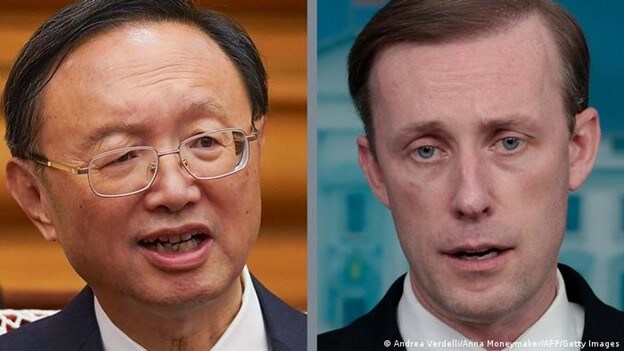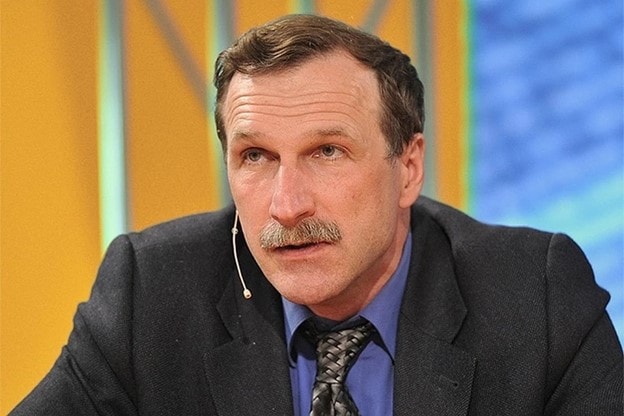Russia viewed Chinese economic strength as its ace in the hole prior to embarking on its invasion of Ukraine. Western sanctions were expected although not in their current intensity, but if China put its economic might and productive capacity behind Russia, the effects of the sanctions could be mitigated. Lately, Russia is beginning to cross its fingers with regards to the expected Chinese assistance. It watches uneasily as China has failed to openly endorse Russia's "special military operation." It could not have been happy to read China's Ambassador to Washington Qin Gang writing in the Washington Post stating the following: "Conflict between Russia and Ukraine does no good for China. Had China known about the imminent crisis, we would have tried our best to prevent it."[1] An article on the Carter Center website written by a Chinese political scientist, who moves in high circles stating flat out that China had to side with the West must have also been unsettling. Russia is also warily watching American efforts, such as the March 14, 2022, meeting in Rome between U.S. National Security Adviser Jake Sullivan and top Chinese diplomat Yang Jiechi with extreme wariness.
MEMRI presents three articles that capture Russian expectations from China in an ascending order of pessimism. China expert, Professor Alexei Maslov is content that the Chinese have not condemned the operation outright. He expects the Chinese to provide goods, once the internal economic situation in Russia stabilizes, but warns against expecting generous Chinese credits. He acknowledges Russia's over dependence on China and urges Russia to diversify. For Kommersant international affairs columnist Maxim Yusin it is not clear which way China will jump. Yusin reminds China that it needs a strong Russia for its inevitable confrontation with the US, but is uncertain whether the Chinese will be persuaded by this logic, and he admits that China may disappoint Russia. Political scientist George Bovt predicts that China will side with the West on direct sanctions while perhaps accommodating Russia on indirect ones.
The three articles follow below:

Top Chinese diplomat Yang Jiechi and US National Security Council Adviser Jake Sullivan (Source: Dw.com)
Professor Alexei Maslov: China Is An Important Partner, But It Should Not Be The Only One
Moskovskiy Komsomolets' interview with Professor Alexei Maslov, the most optimistic of the three articles is still titled "China's Great Game: Russia Falls into A Dangerous Dependency."
"The United States is putting pressure on China to force it to take a disadvantageous position for Russia against the backdrop of the Ukrainian conflict. What is Beijing's policy today and how much our country can count on support from the Celestial Empire, how dangerous is Russia's growing dependence on China - we talked about this with an expert.
"'Beijing has repeatedly formulated its position on the Ukrainian crisis,” says Professor, Doctor of Historical Sciences, Director of the Institute of Asian and African Countries of Moscow State University ...Alexei Maslov. - In the statements of both Xi Jinping and Foreign Minister Wang Yi, it was argued that any conflict should be resolved in an absolutely peaceful manner. That is to say, Beijing has never officially spoken out in support of the military part of the Russian operation and talks all the time about the need for a peaceful resolution.
"'Moreover, at the session of the National People's Congress of China (NPC), which closed a few days ago in Beijing, Xi Jinping spoke about the responsibility of all peoples for the collapse of world trade - on which China is heavily dependent.
"'But at the same time, Beijing has been pretty brutal in exploiting this situation to retaliate against the United States. Firstly, China demanded that Washington publish a list of all American laboratories where biological weapons are being developed (and, apparently, this includes Ukraine) - because the Americans blamed China for this. And secondly, anti-American rhetoric has noticeably increased in China. Moreover, both official articles and even Chinese bloggers, in describing the events in Ukraine, say that the United States is behind all this. All publications on the Ukrainian conflict are connected with accusations against the United States that they stimulated this situation, that they tried to take away the country's independence, and so on.
"'China is currently solving its problems in this fashion. First of all, [comes] the task of responding to America. Because the Chinese are extremely offended by the fact that the United States for at least the past two and a half years has not only criticized China very harshly, but also restricted it in all global trade.
"'If we talk about China's position vis a vis Russia, then, we of course understand that now Beijing will not speak clearly in support of Russian policy on Ukraine. But it won't speak out against it either. That is, China will remain deliberately silent. Because for China Russia is a strategic ally in terms of confronting the United States.
"'Plus, we must understand that, on the one hand, the Chinese are technically ready to supply us with a full range of products (for example, high-tech products, household appliances, consumer electronics, cars, car parts, textiles, etc.). But on the other hand, it should be borne in mind that today China will not rain down its mass of commodities upon Russia - until the ruble stabilizes. And China will not allocate serious loans until the Russian internal situation clarifies.
"'In addition, many goods are contracted - if they come in small batches, they can be delivered, but large batches will be reassembled and Chinese production capacities will need to be expanded for Russia. There may also be issues about payment for goods already delivered from Russia, because many contracts were concluded according to the old ruble-dollar-yuan correlation, now the correlation is different. So, China is taking a break.
"'But the most important thing we are interested in is not only the purchase of some Chinese goods, the problem is to create high-tech joint ventures with China on Russian territory. That is, not to buy, roughly speaking, Chinese machines or printed circuit boards, but to create joint production. Moreover, our plants near Zelenograd, near Tula, near Kaluga are, in principle, ready to accept such enterprises, but for a long time this whole thing was in a situation of eternal negotiations and goodwill declarations.
"'Summing up, we must be aware that China is obviously not taking an anti-Russian position, but very carefully speaking out on political issues.
– That is, you can’t really count on the fact that China will provide a strong shoulder to help Russia cope with the problems arising from sanctions?
- Now it is not necessary. But China will not interfere. The main issue now is the creation of a Russian-Chinese unified settlement system. And many Russian banks have already joined this system, but so far we do not see that it is actively working. Plus, China, most likely, will not object to the accession of Russian banks to the UnionPay system and the creation of co-branded Mir and UnionPay cards. But UnionPay is not accepted for all electronic payments, but rather for personal purchases. Therefore, some issues related to the withdrawal of Visa and Mastercard will be resolved, but not all.
SUPPORT OUR WORK

– In the run-up to the meeting scheduled for March 14 in Rome between the between U.S. National Security Adviser Jake Sullivan and top Chinese diplomat Yang Jiechi, the U.S. politician spoke to the media with unequivocal threats of serious consequences that China risks encountering should it help Russia circumvent sanctions. What "consequences" are we talking about?
- All the consequences that can be discussed are the consequences not solely for China, but for all world trade at the very minimum, including for the USA. Most likely, there will be talk about raising tariff rates for the supply of goods from China. The United States will show that the American market is more capacious than the Russian one, and there is no need to switch to it.
Last year, China traded almost $750 billion with the US and $146 billion with Russia. In addition, we can talk about restricting the Chinese' access to American technologies, blocking a number of Chinese goods on the American market, and banning the purchase of food products in the United States (which is very important for China). And the most important thing, of course, is the revocation of a number of licenses and the use of patents by China. But I repeat, this will generally be a blow to world trade in its entirety.
- If relations between our countries deepen and expand in the future, doesn't this pose a threat that the Russian economy may become dependent on China?
– Of course, such a possibility exists. Because a certain antithesis for oil and gas trade is disappearing in our country, and most importantly, of course, binding all commodity and financial flows to China is an extremely uncertain business.
But we have no other solution. Moreover, today Russia does not depend on Chinese investments, they are still extremely small, for various reasons, China was simply not interested in investing in Russian enterprises. I suppose that we need to develop other mechanisms, that is, not rely only on China, but expand cooperation with other countries in every possible way.
No one will replace China, but in aggregate we must diversify our interaction - this is, of course, Vietnam, Indonesia, Myanmar, and undoubtedly India, and African countries. That is, here we must understand that China is an important partner, but it should not be the only one.
- In China, they have recently been talking about the prospects for the transition to "green energy". Doesn't this pose a threat to the export of Russian oil and gas to this country?
– No, the fact is that, in principle, when China says that by 2060 it must switch entirely to a carbon-free economy, the point is not that the country is giving up oil and gas, but that the Chinese are creating technologies that do not produce harmful emissions into the environment. And, although China is quite actively producing alternative energy sources (for example, solar panels, etc.), they will not be enough to supply China as a whole. Moreover, we see that the Chinese have increased rather than decreased purchases of Kuzbass and Yakut coal. So, it's not the biggest threat.[2]

Alexei Maslov (Source: Interfax.ru)
Maxim Yusin: China May Want To Turn Russia Into A Giant North Korea
Maxim Yusin pleads with China to remember that it needs a strong combat-capable Russia on its side for the inevitable clash with the US but acknowledges that the Chinese may be guided by other interests.
"The outcome of the most brutal confrontation that Moscow and the West have entered depends largely on whether there will be total international isolation of Russia, as the United States and its allies are seeking. So far, this question remains unanswered. The position taken by China will be of key importance. Will it agree to go toe-to-toe with the West in order to support its Russian partner. And in general, after everything that has happened in recent weeks, will China continue to view the Kremlin in this capacity. Because there is an alternative scenario.
"The pragmatic Chinese will solve several of their problems at Moscow's expense. They will take advantage of the fact that Russia, for the time being, will now become the United States' principal adversary. They will continue to accumulate strength and strengthen their own economy. The Chinese will try to avoid possible sanctions that Washington is threatening all countries that assist the Kremlin in coping with the blockade. They will impose tough conditions on Moscow for future cooperation, for example, they will buy sources of energy from it not at market prices, but at a huge discount, slightly higher than the cost price. And why not, if Russia has few alternative [export] markets left, oil and gas will still have to be supplied somewhere.
"There is a high probability that the PRC will want to extract maximum advantage from the situation, in fact, making the Russian economy its raw material adjunct. And in the future, [the Chinese will] turn Moscow into an analogue of a giant North Korea, whose economic survival depends primarily on ties with Beijing – both official and unofficial, legal or illicit. But certainly on China's terms - it is unlikely to do anything detrimental to itself.
"Here, actually, one question arises. If China's support turns out to be insufficient, if sooner or later Moscow is defeated in its confrontation with the West, this could have dire consequences for Beijing in a strategic perspective. Because, the deep-seated contradictions with the United States have not disappeared, a clash with the world's main superpower is only a matter of time. And it is important for Beijing that Russia, with its resources and nuclear weapons, be in the Chinese, and not in the Western camp. And not in a weakened, exhausted state, but in the most combat-capable state. And here the most important thing is to understand whether the PRC, having challenged the West and playing the long game, is willing to support it in such a state.
"As for Moscow's other potential partners, practically all of them have either already found themselves or will inevitably come under severe pressure from the United States and Europe, who will demand that ties with Russia be kept to a minimum.
"Some, like Venezuela, will be promised the lifting of the oil embargo in exchange. Others, like Serbia, will simply be subjected to the most severe pressure, exploiting Belgrade's vulnerable geopolitical position surrounded by NATO members on almost all sides and whose economy is vitally dependent on ties with the EU.
"Some states, even those with the status of US allies, have so far managed to defend their 'special path' without joining the sanctions and acting in the capacity of intermediaries. First of all, this concerns Turkey and Israel. A high probability exists that in our new reality, these countries will almost become Moscow's main gateway to the West, with which formally relations will be frozen, but informally there will be at least some points of interaction. And in this sense, Turkey and Israel will play approximately the same role that neutral Switzerland and Sweden played during the Second World War.
"As for the ways of overcoming and circumvent sanctions, here, apparently, a prominent place will be given to Russia's neighbors, its partners in the CIS and the CSTO. It can be assumed, for example, that the role of Kazakhstan will sharply increase. And Georgia and Moldova, which are by no means friendly to Moscow, behaved quite pragmatically (and cautiously) by refusing to join the sanctions. Thereby, they have created numerous future opportunities for themselves to do business on smuggling, gray streams, legal and not quite legal schemes that will inevitably appear.
"Surely, many of these schemes will also be implemented through the Arab monarchies of the Persian Gulf, which, thanks to Iran, have gained vast experience in how to circumvent sanctions, organize smuggling and profit from the confrontation between the West and a rogue state. In general, in the new world that has come for all of us after February 24, there will be many surprises, paradoxes and cynicism. Life won't stop. It will just become different and altered beyond recognition. And this, alas, was independent and remains independent of our wishes."[3]

Maxim Yusin (Source: Ok.ru)
George Bovt: 'Don't Expect China To Go On The Rampage In Its Relations With America'
"Chinese Foreign Minister Wang Yi was quick to respond to Washington after US warnings about aid to Russia in circumventing Western sanctions. Once again having recalled Beijing's neutrality in the Russian-Ukrainian conflict, a high-ranking Chinese official at the same time made it clear that possible restrictive measures by the United States for supporting Russia would not go unanswered. Beijing has repeatedly stated in the past that it opposes unilateral sanctions as a method of doing business in international politics. At the same time, there has never been a statement from the Chinese capital that China is ready to sabotage, let alone openly oppose US anti-Russian sanctions. Or ignore them.
"Those who wanted to see the hesitancy in Beijing's foreign policy on this issue immediately drew attention to an article published on March 12 [4] by Hu Wei, a political scientist living in Shanghai, who is known to be associated with the country's State Council. That is, as we say, he is a person with 'entry to the corridors of power.' The main message of the publication runs counter to the officially declared line of the Chinese Communist Party. Moreover, Hu Wei is highly critical of China's support for Russia. 'The Russian military operation against Ukraine has caused great controversy in China. Its supporters and opponents were divided into two irreconcilably opposing sides,' he writes. He also called the actions of the Russian president "an irreparable mistake" from which China should distance itself. 'It will take another week or two before China loses its room to maneuver. China must act decisively,' says a knowledgeable political analyst.
"Well, since there is a widespread opinion that Chinese political scientists do not write anything just like that, this article caused a great resonance. It was perceived by many as an indirect, veiled signal of official Beijing's alleged dissatisfaction with what is happening in Ukraine. Supporters of this interpretation proceed from the fact that China objectively suffers greatly from the price rises for raw materials and food products against the backdrop of the special operation in Ukraine. And It would like the operation to be completed as soon as possible and the markets to calm down.
"However, he was not the only one who would like to be reassured. Of course, one should not rush to draw far-reaching conclusions on the basis of but a single article, even if it is an approximate analysis. It was originally published on the website of the Carter Center, based in the US city of Atlanta. The [center] did not order [the article] from the author, it was sent on his own initiative. After causing a public outcry, it also suddenly turned out that neither the English nor the Chinese version of the site cannot be opened in China itself, and the author of the publication became unavailable for comment.
"So far, the situation with the scandalous publication has not been developed at the official level. At the same time, limiting itself to a general refutation of the American data about an alleged request from Russia for military assistance, Beijing then did not refute in detail the accompanying more specific information that it allegedly referred to drones of the same type that China had previously sold to Saudi Arabia, Pakistan and the Arab Emirates.
"The current bitter disputes between America and China over Russia are already very costly to the Chinese companies. On March 14 alone, US-listed shares of these companies fell 12% after losing 10% for two consecutive days the day before. Investors are clearly wary of the companies being delisted from US exchanges as a possible form of US retaliation. Moreover, there have already been precedents for such sanctions. In addition, it is necessary to consider that the United States and the European Union account for over a quarter of the Chinese foreign trade volume, while Russia accounts for less than 3%.
"Therefore, Western analysts, as well as politicians, proceed from the fact that Beijing will be vulnerable to pressure from America and will choose some kind of flexible, intermediate option: on the one hand, submitting to formal sanctions against Russia, on the other hand, where there are no direct restrictions, it will go towards Moscow. Another thing is that the sanctions are already comprehensive and under the current conditions, any cooperation between Beijing and Moscow will be almost impossible to hide. Don't expect China to go on the rampage in its relations with America. At the same time, it is no less obvious that China is objectively disinterested in Russia losing completely in this situation. Because it is unlikely to add stability in the world."[5]

George Bovt (Source: Radiokp.ru)




